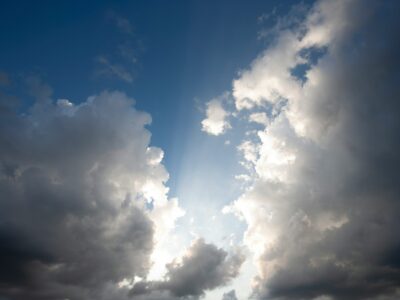See, a king will reign in righteousness
Isaiah 32: 1-4 (NIV)
and rulers will rule with justice.
Each one will be like a shelter from the wind
and a refuge from the storm,
like streams of water in the desert
and the shadow of a great rock in a thirsty land.
Then the eyes of those who see will no longer be closed,
and the ears of those who hear will listen.
The fearful heart will know and understand,
and the stammering tongue will be fluent and clear.
My son and I have been practicing close listening on our afternoon walks. “Shh,” I’ll say, stopping him on the path. “Do you hear that?” We listen and count the different bird songs. We try to identify the variety of natural and manmade noises surrounding us. The woods that may seem silent are quite loud when you stop to hear what’s going on, from the rustle of leaves to the creaking of swaying trees to even the sound of your own heartbeat.
Jesus ends many of his parables in the Gospels assuring the disciples, “He who has ears, let them hear.” In the midst of injustice, chaos, and stress, it is hard to hear anything except the wind in the storm. Natural places give each of us space to listen intentionally, and train our ears to hear clearly. The heightened awareness helps us to stay tuned in to what the Holy Spirit is doing around us, so that we can go back to the chaos and stress and become pursuers of justice and peace, able to listen and discern between falsehoods and truth.
Points of Reflection
- What times during the day are you least attuned to what is being said around you? When are you most able to listen?
- Is there a place you go where you feel most at peace and able to hear the still, small voice of the Lord? What is it about this place that gives you the space to truly listen?
For the Kids
- What do you think Jesus means when he says, “He who has ears, let them hear?” Don’t most people have ears?
- Do you have a quiet place you can go to be still and hear what’s happening around you? What do you hear? How many different sounds can you identify?
Faith / Works
If you have a place—let’s call it a sacred space—that allows you to be still and listen to what is happening around you, make a plan to go there. Allow yourself the time to listen and perhaps journal about what it is you hear around you. Where do the sounds lead you? What do the sounds remind you of? Make this place an agendaless space to allow the Holy Spirit to meet you and say whatever needs to be said. May we have ears to hear!
Readings
Poets tend to bend their ears to the world to listen and hear what the earth and the sacred have to say. Wendell Berry, Mary Oliver, Emily Dickinson, William Blake, and Walt Whitman are classic examples of poets who combine their meditations on things of this earth with spiritual matters. Consider picking up the works of one of these poets, and then go explore today’s contemporary spiritual writers, such as Tania Runyan, Gregory Orr, Alicia Ostriker, Mark Jarman, Luci Shaw, Franz Wright, Julia Kasdorf, Jean Murray Walker, and Nicholas Samaras. Dr. Philip Mitchell, Associate Professor of English at Dallas Baptist University, has assembled this list of recommended poets who write about their faith.





 Copyright
2024
Root and Vine
Copyright
2024
Root and Vine